An ancient seal discovered by archaeologists may back Bible story
Latest News
Reported by Newsweek:
An archaeologist working with the Temple Mount Sifting Project has uncovered a well-preserved clay seal stamped with Paleo-Hebrew letters that read, according to project researchers, "Belonging to Yed[a']yah (son of) Asayahu."
The name Asayahu appears in biblical accounts associated with the reign of King Josiah of Judah. Among Josiah's trusted envoys was a senior official named Asayahu, described as "the king's servant."
Researchers said the seal's findspot and style of writing date it to the late First Temple period (late 7th–early 6th century BCE), raising the possibility that it belonged to a high-ranking official connected to Temple administration at a historically significant moment.
Given his prominent role, it may be reasonable to assume that Asayahu's son, Yeda'yah, may have also served in a prominent position, either at the same time or shortly thereafter.
The seal provides a rare material connection to a name that appears in biblical texts describing reforms under King Josiah and related Temple activity, offering archaeologists a datable artifact that could illuminate administrative practice in Jerusalem before the Babylonian destruction.
Archaeologist Mordechai Ehrlich found the clay seal while examining material recovered by the Temple Mount Sifting Project, and project researchers rapidly analyzed and publicly announced the artifact shortly before the Jewish fast of Tisha B'Av.
Researchers Dr. Anat Mendel-Geberovich and Zachi Dvira read the inscription as "Belonging to Yed[a']yah (son of) Asayahu," and dated the script style to the late First Temple period, approximately the late-7th to early-6th century BCE.
Read more here.



